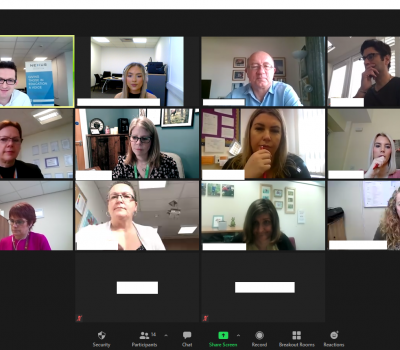

Dr Poppy Gibson and Annelies Paris

Introduction
The past few years have brought with them many challenges, perhaps more challenges than ever before. The coronavirus pandemic affected everyone around the globe, with repercussions for mental health and social behaviours that are still prevalent in our societies today. More recently, the war in Ukraine has had global effects, with the United Kingdom offering a safe haven to Ukrainian refugees under the Homes for Ukraine scheme, leading to Ukrainian children attending our primary schools, and Ukrainian nationals seeking work in our communities. These global issues show the power in communication and collaboration, and the need for us to work together and support each other.
The co-authors of this think piece encourage the reader to consider why learning foreign languages, also often referred to as Modern Foreign Languages (MFL), is more than just a subject.
Background on teaching MFL in our primary curriculum
It wasn’t until the most recent National Curriculum rolled into our primary schools here in England in 2014 that we saw MFL become statutory for Key Stage 2 (ages 7-11). Interestingly, the first pilot of language learning took place 60 years earlier in the 1960s, but it seems it somehow took policy makers several decades to realise the value of this subject (yet we may argue that although some schools show best practice and explore languages as early as in the Early Years stages, the fact that MFL is still not statutory in KS1 means that many schools do not).
Can you guess which language was the first language piloted in schools?
It was of course, French. With France being one of our closest neighbouring ‘foreign’ countries, it was logical to teach this language with the idea that many people were travelling to this country for business or pleasure. Interestingly, many years later, although schools can choose the language(s) that they deliver, French is still the most commonly taught, at around two thirds of the language picked. Spanish and German are the next most popular languages, whilst in most recent years languages such as Latin and Arabic have found their way into some classrooms, meaning that MFL sometimes drops the ‘M’ of its name to simply be FL, reflecting the inclusion of these ancient languages.
Why is learning a language important?
In order to address the necessity of language learning in schools, including at primary level, we need to understand the benefits. Not only are there social-emotional benefits, such as becoming more inclusive, understanding the cultures of other people and opening up discussions about the struggles of others, but it also has future benefits, such as opening up new career prospects (Jasmin., 2021) or the option to live abroad. The most significant benefits are the cognitive ones, with multiple pieces of research finding that bilinguals outperform in cognitive tasks (Elenbaas., 2021). For example, the acquisition of learning new grammatical rules and language structure, results in not only new knowledge, but development of problem-solving skills (Athanosopoulos et al., 2015). The ability to multitask is also enhanced, as bilinguals require a constant control regulation for balancing the two languages, which strengthens these cognitive control regulators and results in better performance in cognitive tasks (Elenbaas., 2021). Research continues into this field so why are these results not being listened to? Why are languages not given as much consideration when developing the curriculum or given as much importance in schools?
Barriers to MFL teaching
Multiple issues arise through the implementation of modern foreign languages in schools. Firstly, there is a lack of consistency within its teaching. It is not a requirement to teach languages before KS2, however, some schools teach it as early as Reception. This creates a predicament for secondary schools in terms of differentiation and building upon prior knowledge, as this can vary vastly depending on schools attended. Another issue is the self-confidence of staff. Not all schools have the funding to employ specialist language teachers, so some teachers have to deliver MFL, or it’s covered during PPA by HLTAs or non-class teacher staff. If staff have no prior knowledge or background in languages, they may have low self-efficacy which can lead to a reliance on external resources, a hesitancy to deepen exploration of the language, or inaccurate teaching, such as the classic ‘cheveaux’ instead of ‘cheveux’ error in French. There is also the difficulty in intrinsic motivation in children. When they know English is a universal language or if they are aware that their teacher is not a bilingual themselves, it can make the learning of languages seem “pointless,” or “stupid.” For children to feel more engaged and excited by languages, and to support teachers in delivering MFL lessons, here are some simple strategies to promote language learning in the classroom.
Some simple strategies to build into your week to promote language learning
When timetables in the primary classroom are fit to bursting with all the wonderful subjects we have to offer, the co-authors of this piece encourage you to consider simple strategies to use throughout the week to encourage your pupils to practice languages in an integrated way. Here are five simple activities to try:
1. Take the register in a different language:
Pick a different language each day or week, and encourage your pupils to say ‘good morning’ and ‘good afternoon’ in that language with you.
2. Make the most of P.E.
Warm-up activities: tailor your activities with vocabulary from another language. For example, instead of playing ‘North, South, East, West’ where the children run to different sides of the hall or playground, you could use four words in a different language to practice the children listening to them as you call them out.
3. Add signs to your displays and resources:
Instead of just having English signs around your room, encourage inclusivity through multilingual signs in different languages.
4. Count in other languages:
If you are counting your pupils in the line, counting people in a group, or simply counting up to ten until your class are ready to learn, why not use a different language?
5. Start or finish your day with a song!
YouTube has thousands of simple songs in different languages; why not enjoy learning one with your class during the day; many also have sing-along words, subtitles or you can add closed captions so you can read as well as listen. Songs are proven to be one of the most effective ways to help us learn and remember vocabulary.
References
Athanasopoulos, P., Bylund, E., Montero-Melis, G., Damjanovic, L., Schartner, A., Kibbe, A.,
& Thierry, G. (2015). Two Languages, Two Minds: Flexible Cognitive Processing
Driven by Language of Operation. Psychological science, 26(4), 518-526.
https://doi.org/10.1177/0956797614567509
Elenbaas, B. (2021). Second Language Learning in Elementary Years: Cognitive and Social-Emotional Benefits.
Jasim, Y. 2021. Benefits of Learning A Second Language (May 20, 2021). Available at SSRN: https://ssrn.com/abstract=3895362 or http://dx.doi.org/10.2139/ssrn.3895362
Annelies’ bio
Annelies is a Year 1 teacher in a two-form primary school in Dorset. With 10 language qualifications under her belt, including German and French A-levels, Annelies was hired as a specialist French teacher in a three-form primary school upon having qualified with a Primary PGCE and QTS in March 2020. Her Bsc in Psychology, alongside her private tutoring in languages, has allowed her to gain confidence in providing engaging and effective language provision. Annelies also goes by the alias Petite Primary on YouTube and Instagram; a platform that provides trainees and teachers with tips, advice and information on teaching. Annelies has a passion for supporting new teachers, both throughout their training, to job applications, and through their ECT. She has helped edit nearly 100 personal statements and has published over 100 videos, consequently helping trainees across the UK start their career in teaching with confidence.